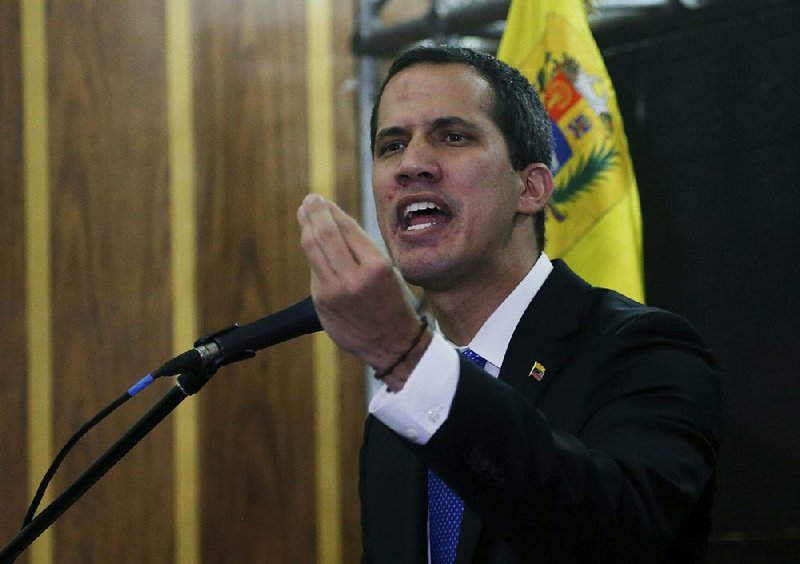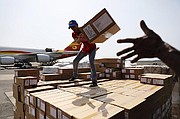CARACAS, Venezuela -- Diplomatic efforts aimed at resolving Venezuela's crisis accelerated Thursday as the government and opposition sent envoys to talks in Norway.
The Norwegian attempt to mediate, confirmed by opposition officials, comes as tensions turned into street violence when the opposition called in vain for a military uprising on April 30. Details about the initiative, including whether envoys from opposing camps would even negotiate directly, were scarce.
But it coincides with diplomatic efforts elsewhere: Opposition leader Juan Guaido said in Caracas that he planned to meet a delegation from a mostly European group of nations later Thursday, and Canadian Foreign Minister Chrystia Freeland met Thursday with Cuban Foreign Minister Bruno Rodriguez in Havana.
Norway has hosted secret peace talks over the years. They include the negotiations between Israelis and Palestinians in September 1993, talks between the Philippine government and Maoist rebels in 2011, and the brokering of a 2002 cease-fire between Sri Lankan government and Tamil Tiger rebel negotiators. Seven years ago, negotiators from the Colombian government and left-wing rebels held their first direct talks in a decade in Norway.
The Norwegian Center for Conflict Resolution has worked behind the scenes since last year to bring the two sides in Venezuela together. In October, it sponsored an initiative to send a Harvard-trained conflict resolution expert to Caracas to foster dialogue. In recent months, with the support of Norway's Foreign Ministry and diplomats based in Bogota, Colombia, its representatives made several trips to Caracas.
Per Wiggen, an official from Norway's Foreign Ministry, did not confirm planned talks in Oslo, though Norway has urged the two sides to talk since February. Minister Ine Eriksen Soereide told lawmakers on March 5 that Norway could be a mediator.
The representatives in Norway include Information Minister Jorge Rodriguez on the government side and Stalin Gonzalez, a leading member of the opposition-controlled legislature, according to opposition officials who spoke on condition of anonymity because of the sensitivity of the initiative. Without elaborating, Venezuelan President Nicolas Maduro said Rodriguez was on a "very important" mission outside Venezuela.
The myriad diplomatic efforts reflect a recognition in Venezuela that neither side has been able to prevail in the struggle for power, leaving the country in a state of political paralysis after years of hyperinflation and shortages of food and medicine.
Guaido confirmed that envoys were in Norway but warned that the opposition won't enter into any "false negotiation."
He said any talks on resolving the Venezuelan crisis must lead to the end of Maduro's government, its replacement by a transitional administration and free and fair elections.
Maduro disputes opposition claims that his re-election last year was illegitimate and says U.S. sanctions imposed on Venezuela to try to oust him should be lifted.
Participation in the mediation effort is a reversal for the opposition, which has accused Maduro of using previous negotiations between 2016 and 2018 to play for time. Maduro, in turn, alleges the opposition tried to seize power by force. U.S. officials have said they are focusing on diplomatic and economic measures to force out Maduro. However, Guaido said his Washington envoy would meet Monday with the head of the U.S. Southern Command.
The opposition also says Cuba has propped up Maduro with military and intelligence help. Cuba has denied this. Marcelino Medina of Cuba's Foreign Ministry was in Norway on Tuesday and Wednesday as part of what his office called a tour of Scandinavian countries.
Meanwhile, the International Contact Group, comprising eight European nations, the European Union and four Latin American countries, has also been working on the Venezuelan problem. The group formed after Guaido, the head of Venezuela's National Assembly, declared himself interim president in January in a direct challenge to Maduro, who says his government champions the socialist principles of his predecessor, Hugo Chavez.
The opposition, backed by more than 50 nations, says Venezuela's dire economic state is the result of years of corruption and mismanagement. Maduro, whose allies include Russia, blames the country's problems on more recent U.S. pressure.
Information for this article was contributed by Scott Smith, Michael Weissenstein, Mark Lewis and Luis Alonso Lugo of The Associated Press.
A Section on 05/17/2019


